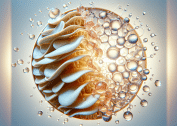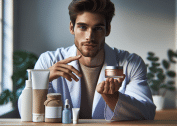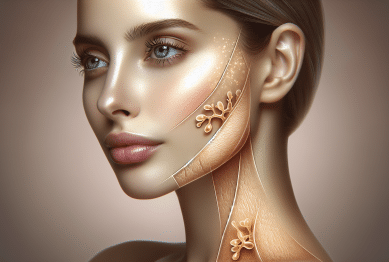Discover the hidden world of collagen and its real impact on healthy, glowing skin. This guide reveals the science of collagen, strategies to support its production naturally, and what influences its effectiveness in beauty routines.
Understanding Collagen and Its Role in Skin Wellness
Collagen is one of the most talked-about proteins in wellness and beauty conversations. It’s commonly associated with youthful, firm skin, but few understand how this protein actually works within the body. Collagen forms a structural framework for skin, providing strength and elasticity that keeps the complexion smooth and resilient. As the foundation of the skin’s dermal layer, collagen declines with age and exposure to environmental factors, making its maintenance an important concern for anyone interested in long-term skin health.
Beyond its supportive qualities, collagen interacts closely with other elements in the skin. Hyaluronic acid, elastin, and essential fatty acids all work with collagen to lock in moisture and keep skin supple. When collagen breaks down, it’s not just about wrinkles; the entire skin barrier may suffer, increasing the risk of dryness and irritation. This interdependence makes collagen supplementation and topical treatments a focal point for many beauty and wellness strategies—yet, the real key lies in understanding how the body naturally produces and utilizes this vital protein.
Diet plays a primary role in the body’s collagen synthesis. Foods rich in vitamin C, amino acids, and antioxidants supply the necessary building blocks for collagen fibers. Some find that boosting collagen intake—whether through supplements or nutrient-dense foods—can influence the skin’s texture and appearance. The link between internal wellness and visible beauty can be profound, emphasizing lifestyle choices alongside topical products for optimal results (Source: https://www.hsph.harvard.edu/nutritionsource/collagen/).
Common Causes of Collagen Loss and How to Minimize Them
Collagen loss is a natural part of aging, but several habits and environmental factors can accelerate this process. Sun exposure is a primary culprit, as ultraviolet (UV) rays break down collagen fibers and inhibit new formation. Smoking and excessive alcohol consumption also play roles, causing oxidative stress and reducing the body’s ability to repair itself. Understanding these triggers is essential for those looking to preserve skin’s youthful integrity, as prevention often starts with lifestyle adjustments.
Pollution is another factor often overlooked in beauty routines. Airborne toxins can settle on the skin, generating free radicals that break down collagen. Regular cleansing, barrier-repair creams, and antioxidants all play a part in minimizing this damage. Simply moving through daily urban environments exposes skin to stressors that make a consistent protective strategy vital for modern wellness advocates (Source: https://www.ncbi.nlm.nih.gov/pmc/articles/PMC7084617/).
Other contributors include hormonal changes, poor sleep, and inadequate nutrition. The body repairs itself during restful sleep, and insufficient rest limits this process. Balanced diets, regular hydration, and managed stress can help preserve the body’s capacity for collagen synthesis. Focusing on everyday choices can be more effective than relying solely on topical creams or injectable treatments, especially for individuals invested in a holistic approach to wellness.
Exploring Collagen Supplements: What to Consider
Collagen supplements are increasingly popular in personal wellness routines. Options range from hydrolyzed collagen powder to collagen-rich bone broths and gummies. Each type claims to boost skin radiance and elasticity, but how well do these products work? Research suggests that hydrolyzed forms—where collagen is broken down into peptides—may be easier for the body to absorb, but these results can vary depending on other lifestyle factors and the presence of key nutrients.
For those considering collagen supplements, examining quality and sourcing is crucial. Marine, bovine, and plant-based collagen vary in amino acid profiles and absorption rates. Transparency and third-party testing reports can help distinguish reliable products from those with little evidence to support their claims. According to the Academy of Nutrition and Dietetics, the body may benefit even more from a well-rounded diet that encourages internal collagen production naturally (Source: https://www.eatright.org/health/wellness/preventing-illness/should-you-take-collagen-supplements).
It is important to set realistic expectations. While some users report improved skin hydration and firmness, robust scientific consensus is developing. Supplements can be one tool in an overall plan—which should also include skincare, sun protection, sleep, and hydration. Consulting with a healthcare provider can help determine if supplements fit within a broader approach to healthy aging and beauty goals.
Lifestyle Strategies to Support Collagen Production Naturally
Supporting collagen through daily habits is one of the most sustainable approaches to beauty and wellness. Regular exercise increases circulation, delivering nutrients to skin cells and spurring repair mechanisms. Adequate sleep allows for overnight skin recovery, and stress management—through techniques such as meditation—helps minimize cortisol, a hormone linked to collagen breakdown. These small routines add up, influencing not only how skin looks but also how it functions on a cellular level.
Nutritional choices are equally vital. Protein sources—like lean meats, legumes, and fish—provide amino acids crucial for collagen synthesis. Foods rich in vitamin C, such as oranges, berries, and leafy greens, support the enzymes that assemble collagen structures within the skin. Antioxidants from colorful fruits and vegetables help fight free radical damage, enhancing the skin’s self-repair capabilities and maintaining healthy collagen reserves (Source: https://www.ncbi.nlm.nih.gov/pmc/articles/PMC6121609/).
Sun protection remains the single greatest defensive step. Broad-spectrum sunscreen helps shield collagen fibers from harmful UV rays, drastically slowing visible signs of aging. Together, these steps create a powerful foundation for glowing, resilient skin, blending internal wellness with external care in a holistic beauty strategy.
Trending Collagen Beauty Treatments and What Science Reveals
From microneedling to laser resurfacing, beauty clinics now offer an array of treatments aimed at sparking collagen production. These procedures work by creating controlled micro-injuries that stimulate the body’s natural healing process, encouraging new collagen growth. While results can appear dramatic, treatments usually require several sessions and ongoing care to maintain benefits. Approaching these innovations with curiosity and an understanding of individual needs is essential.
Topical creams with peptides and growth factors boast claims of boosting collagen synthesis, but independent research varies on their effectiveness. Prescription retinoids and vitamin C serums have more science-based support, offering proven pathways to smoother skin texture and lower rates of collagen breakdown. However, optimal results are often achieved through steady, long-term use, rather than overnight transformation (Source: https://www.ncbi.nlm.nih.gov/pmc/articles/PMC3673383/).
Non-invasive tools like ultrasound or radiofrequency deliver heat energy to deeper layers, promoting collagen remodelling with little downtime. Safety, practitioner expertise, and individual skin type should be factored into any decision. Staying informed and realistic about what these beauty treatments can achieve, and consulting professionals when needed, helps ensure the healthiest approach to collagen support.
The Real Connection Between Diet, Hydration, and Collagen Health
Diet and hydration often get less attention than products or treatments, but their role in collagen health is real. Consistent intake of water-rich foods, such as cucumbers and melons, helps maintain skin’s natural moisture levels, indirectly supporting the environment collagen needs to thrive. Cutting back on added sugars and processed foods can further reduce inflammation and protect collagen from premature breakdown.
Certain trace minerals—zinc, copper, and selenium—serve as essential cofactors in collagen construction. Including seeds, nuts, shellfish, and whole grains ensures the body receives these minerals, supporting strong structural proteins in skin and connective tissue. Meal planning and mindful eating offer practical and enjoyable ways to fortify collagen naturally in everyday routines (Source: https://ods.od.nih.gov/factsheets/Copper-Consumer/).
The role of hydration in collagen support goes beyond just drinking water. Herbal teas and mineral-rich broths provide electrolytes, aiding cellular function and skin elasticity. When paired with an anti-inflammatory diet that includes healthy fats and antioxidants, the results can be visible in skin’s radiance and firmness over time.
References
1. Harvard T.H. Chan School of Public Health. (n.d.). Collagen. Retrieved from https://www.hsph.harvard.edu/nutritionsource/collagen/
2. PubMed Central. (2020). Effects of Air Pollution on the Skin. Retrieved from https://www.ncbi.nlm.nih.gov/pmc/articles/PMC7084617/
3. Academy of Nutrition and Dietetics. (n.d.). Should You Take Collagen Supplements? Retrieved from https://www.eatright.org/health/wellness/preventing-illness/should-you-take-collagen-supplements
4. PubMed Central. (2018). Dietary Strategies to Support Collagen Synthesis. Retrieved from https://www.ncbi.nlm.nih.gov/pmc/articles/PMC6121609/
5. PubMed Central. (2013). Skin Anti-Aging Strategies. Retrieved from https://www.ncbi.nlm.nih.gov/pmc/articles/PMC3673383/
6. Office of Dietary Supplements, NIH. (n.d.). Copper Fact Sheet. Retrieved from https://ods.od.nih.gov/factsheets/Copper-Consumer/









